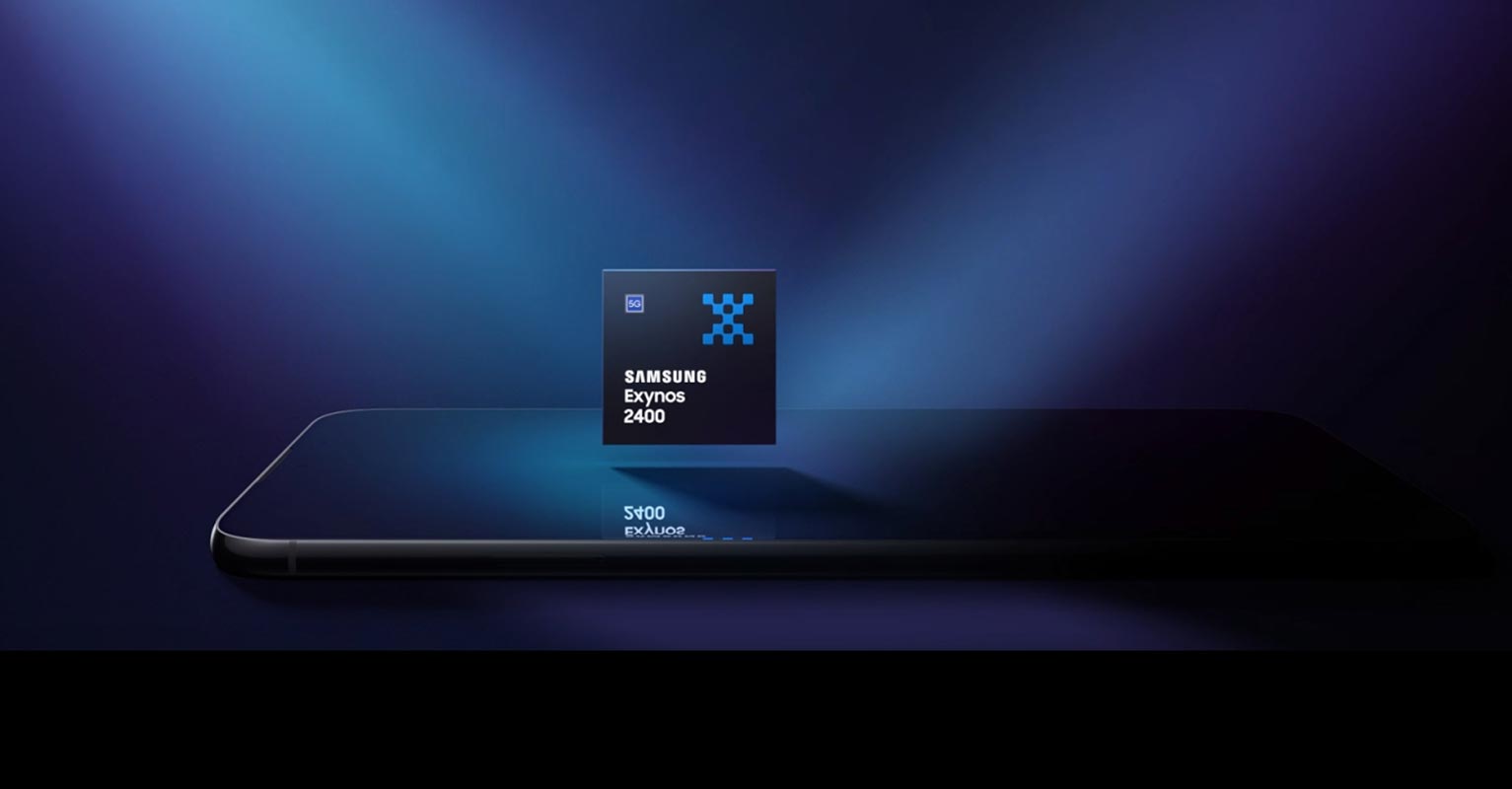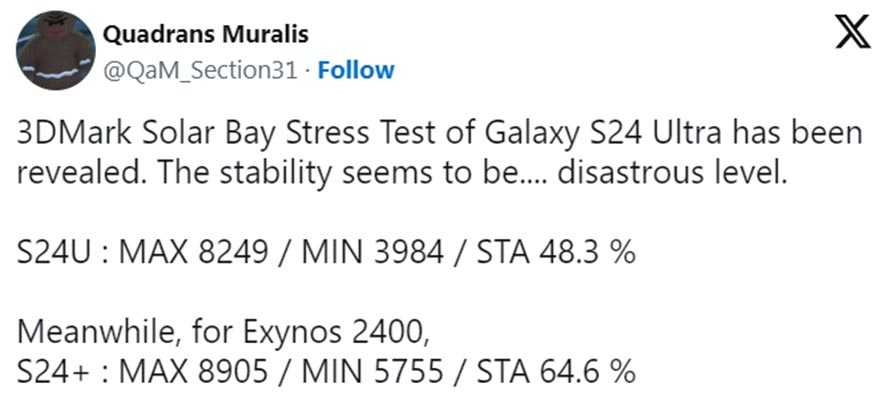Each new release sparks elevated anticipation in the dynamic realm of smartphones, and the Samsung Galaxy S24 has recently become the epicentre of attention, notably due to its Exynos 2400 chip. This buzz has resonated across the global tech community, drawing in enthusiasts eager to dissect benchmark results and discern the nuances between Snapdragon and Exynos technologies. This exploration is not merely a technical analysis but a journey into the future of Samsung’s flagship models, where the performance differentials between these chips could reshape user expectations. As the digital landscape evolves, understanding these benchmark revelations becomes pivotal for enthusiasts, shaping conversations and influencing perspectives on the cutting-edge innovations within the Galaxy S24.
Quadrans Muralis Unveils Benchmark Results
Testing Methodology
Tech enthusiasts often turn to benchmarks to assess a device’s performance. Quadrans Muralis recently shared benchmark results on DCinside, sparking discussions about the S24 Ultra’s stability, especially under the 3DMark’s Solar Bay stress test.
Stability Concerns
The reported scores of 8,249 (maximum) and 3,984 (minimum), with an average stability of 48.3% for the S24 Ultra, raise eyebrows. How reliable are these numbers, and what do they mean for the device’s real-world performance?
Score Breakdown: S24 Ultra vs. S24 Plus

Digging deeper into the numbers, comparing the S24 Ultra and S24 Plus reveals interesting insights. Despite the S24 Plus trailing in maximum score, its higher stability rating of 64.6% hints at consistent performance.
Deal of the Day
Anker 737 Power Bank Now Available for $74: Cyber Monday Deal
Snapdragon vs. Exynos: The Chip Battle
Global Distribution
Most regions will house the Exynos 2400 in the S24 and S24 Plus, while the US market opts for the Snapdragon 8 Gen 3 chip. The S24 Ultra, however, embraces the Snapdragon chip universally. What factors contribute to this distribution strategy?
The Exynos 2400 Leap
Historically, Samsung’s Exynos chips have lagged behind their Snapdragon counterparts. However, the Exynos 2400’s performance leap compared to its predecessor, the Exynos 2200, suggests a potential shift in this trend.
Cooling System Redesign: A Bold Move
Galaxy S24 Ultra’s Revamped Design
At the recent Samsung Galaxy Unpacked event, a key highlight was the complete redesign of the cooling system for the S24 Ultra. The vapour chamber size nearly doubled compared to the S23 Ultra, aiming for more efficient cooling.
Implications of Stress Test Results
However, if stress test results are accurate, questions arise about the effectiveness of this redesign. Could the Snapdragon’s performance be compromised over extended usage due to potential overheating issues?
Unraveling the Snapdragon Mystery
Sprinter or Long-Distance Runner?
The Snapdragon numbers hint at a sprinter-like performance, where initial speed might be impressive, but sustained heat generation could lead to significant throttling over time. How does this contrast with the Exynos 2400’s performance?
Potential Throttling Concerns
While Snapdragon chips have been Android market leaders, some have faced overheating issues. Is the Snapdragon 8 Gen 3 chip prone to similar problems, and what does this mean for the user experience?
Exynos 2400: A Game-Changer?
The standout revelation is the potential game-changing performance of the Exynos 2400. Could this mark a turning point, making Exynos-equipped Galaxy phones as appealing as their Snapdragon counterparts?
The Heat Dilemma: Is Samsung’s Redesign Enough?
The promise of a redesigned cooling system is substantial, but doubts surface if the stress test results hold. Is the Galaxy S24 Ultra equipped to handle prolonged, intensive tasks without compromising performance?
The Future of Galaxy Phones: Snapdragon vs. Exynos
With the Exynos 2400 showing remarkable progress, the future landscape of Galaxy phones becomes intriguing. How will consumers perceive the Snapdragon-Exynos debate, and will this impact purchasing decisions?
Exploring Consumer Reactions
Tech Community Feedback
The tech community plays a crucial role in shaping opinions. What are enthusiasts saying about the benchmark results, and how are they interpreting the potential implications?
Social Media Buzz
Beyond forums, social media platforms are abuzz with discussions. How are users reacting to the performance comparisons, and what insights can we gather from their conversations?
Expert Opinions: What Analysts Say
Performance Insights
Experts provide valuable insights into the benchmark results and the broader implications for smartphone performance. What do they foresee in terms of user experience and market dynamics?
Predictions for the Future
Looking ahead, analysts offer predictions about the trajectory of Snapdragon and Exynos chips. How might this competition unfold, and what developments can we expect in future iterations?
FAQs
How does the S24 Ultra compare to its predecessor?
The Samsung Galaxy S24 Ultra represents a significant leap from its predecessor, the S23 Ultra. Notably, the Exynos 2400 chip showcased remarkable performance improvements, challenging the historical trend of Exynos chips lagging behind Snapdragon counterparts. The redesign of the cooling system, as highlighted in the Samsung Galaxy Unpacked event, also contributes to a more efficient and powerful device.
Is the Snapdragon 8 Gen 3 chip prone to overheating?
While the Snapdragon 8 Gen 3 chip has been a market leader in Android phones, some previous Snapdragon models faced overheating issues. The stress test results suggest a potential sprinter-like performance, where initial speed may be impressive, but extended use could lead to significant throttling due to heat generation. Users may consider this factor when evaluating the device for their needs.
What regions will receive the Exynos 2400 chip?
Most regions globally, except for the United States, will feature the Exynos 2400 chip in the Samsung Galaxy S24 and S24 Plus models. The US market will receive the Snapdragon 8 Gen 3 chip instead. The Galaxy S24 Ultra, however, will uniformly use the latest Snapdragon 8 Gen 3 chip across all regions.
How effective is the redesigned cooling system in the S24 Ultra?
According to Samsung’s claims at the Galaxy Unpacked event, the cooling system in the S24 Ultra underwent a significant redesign, nearly doubling the size of its vapour chamber compared to the S23 Ultra. The aim was to enhance cooling efficiency, especially during intensive tasks. However, the stress test results have raised concerns about whether the redesign can handle prolonged usage without compromising performance.
Should consumers be concerned about potential throttling issues?
Potential throttling issues, indicated by the stress test results, raise valid consumer concerns. While the Snapdragon chip’s initial performance may be impressive, the sustained heat generation could lead to throttling over time. Users should weigh this factor alongside other considerations, such as the redesigned cooling system and the Exynos 2400’s promising performance when making an informed decision about their smartphone purchase.
Wrap Up
In a market where performance is paramount, unveiling the Samsung Galaxy S24’s benchmark results has ignited a dualistic reaction of excitement and scepticism. As consumers meticulously evaluate the device, the Snapdragon versus Exynos debate assumes a central role, with enthusiasts fervently comparing the capabilities of these two prominent chipsets. The effectiveness of the revamped cooling system emerges as a pivotal consideration, as it directly influences the device’s overall success.
The interplay between these elements defines the user experience and shapes perceptions of the S24’s technological prowess. In this arena of high-stakes competition, the benchmark revelations serve as performance metrics and determinants of consumer preferences, accentuating the importance of a device’s technological prowess and cooling efficiency in the ever-evolving landscape of smartphone innovation.

Selva Ganesh is the Chief Editor of this Blog. He is a Computer Science Engineer, An experienced Android Developer, Professional Blogger with 8+ years in the field. He completed courses about Google News Initiative. He runs Android Infotech which offers Problem Solving Articles around the globe.



Leave a Reply